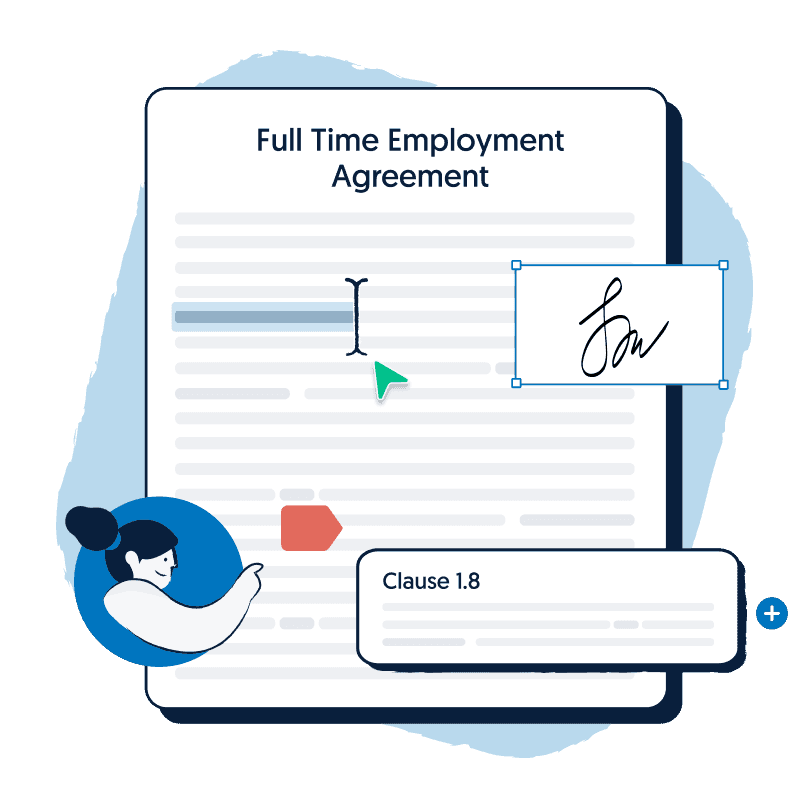As an employer, have you ever wondered whether terminating an employee before they start is legal?
This might sound tempting, but before you proceed, you need to determine whether it’s legal. Alternatively, as an employee starting a new job is always exciting, offering countless opportunities and connections. But what happens if you sign your employment contract and your employer terminates your employment before your first day?
In this article, we’ll explain whether an employee can be terminated before they start their job, the reasons an employer can choose to terminate an employee’s employment contract before they start, and answers to other frequently asked questions.
Read along!
Is it legal for employers to terminate an employee before they start?
It is legal for employers to terminate an employee before they start. However, this is only legal in some circumstances. As an employer, one way you can ensure you’re legally terminating an employee before they start their job is by including a term in their employment agreement that their employment only begins once they start their job.

Get your Full Time Employment Agreement legal document for free.
Can you be terminated before your first day?
Generally, terminating an employee’s employment contract before it starts taking effect, i.e. when the employee actually starts the job, results in an employer breaching their legal obligations because a contract is a legally binding agreement. Therefore the employee who has been terminated can take legal action against their employer.
The employee’s ability to take legal action is particularly crucial if they have sacrificed a lot of time, money, resigned from their existing job, and other job opportunities to start their new job. An employee would be able to sue the employer for the following:
- They can sue the employer for breaching the contract, and this will allow them to recover any losses they have suffered as a result of an employer’s breach
- An employee can sue the employer for lost opportunity due to them signing their employment contract as they could have found a different job and been hired by a different employer
Can an employee who has been terminated before they start make an unfair dismissal claim?
Generally, when an employee faces unfair dismissal, they can apply to the Fair Work Commission for possible solutions under section 394 of the Fair Work Act 2009. However, there are certain conditions that have to be met for an employee to be able to complete this application. These include the following:
- An employee can only apply if they have been employed for at least one year if their employer has 15 employees or less. Therefore, they would be considered to be a small business employer.
- If the employer has more than 15 employees, the employee can apply if they have been employed by the employer for at least six months.
Therefore, employees who have had their employment cancelled before their first day do not meet this working time requirement and are unable to apply to the Fair Work Commission for an unfair dismissal claim.
What are the common reasons an employer would want to terminate an employee before they start?
The most common reason an employee may choose to fire an employee before they start a job is due to an employee failing a pre-employment check. A pre-employment screening is the verification of the employee’s identity and credentials. The purpose of a pre-employment check is to ensure an employee has not lied on their resume or has a criminal background related to the work they are applying for.
As a pre-employment check is a necessary part of the job interview, the employer can terminate a potential employee.
As an employer, you should be careful to avoid terminating an employee’s employment because of discriminatory reasons, as this is illegal as employers are legally required to avoid discrimination when hiring employees.
When can an employer terminate an employee after they start their job?
Employees usually commence a job with a probationary period of three or six months. During your probation period, your employer can terminate you as long as they provide you with one week’s notice. If you have already started your role, your new employer may terminate you with little or no notice if you commit serious misconduct.
When can an employer terminate an employee before they start without providing a remedy?
It is legal to terminate an employee without notice in some situations before a potential employee starts the job. In these circumstances, there are no remedies available for the employees. Two common reasons an employee may be terminated before they start their job is if they commit serious misconduct or if the employer discovers that the employee has lied on their resume.
1. Serious misconduct
If an employee commits serious misconduct before starting the job, their employment can be terminated without prior notice. Serious misconduct can include the following:
- Bullying or harassment of fellow employees
- Fraud
- Theft
- Putting another’s health and safety at a serious risk
- Putting their employer’s reputation or profits at risk
These actions involve breaching the company code of conduct.
2. Lying on their resume
An employee can be fired if they lied on their resume. For example, if you are hired for a nursing position but have provided a transcript of a fake nursing degree, you can be fired. In this case, this person has committed fraud, and they can be fired immediately without notice. If an employee has been fired due to lying on their resume, there are no remedies or compensation available to them.
How can you determine whether you can terminate an employee before they start the job?
If you want to terminate an employee’s employment contract before their start date, you should have a look at their employment contract to see whether there are any terms in the contract that allow you to do so. For example, the contract could include a term that outlines that the position is conditional upon the employee starting the job. On this basis, it would be legal to terminate the employment contract before the employee begins working.
Alternatively, if the employment contract the employee has signed contains a probationary period, it may not be possible to terminate the employee without a cause before the start. In this situation, the employee won’t be able to be terminated before they start, and you’ll have to provide them with the notice period that is included in their employment contract.
National employment standards can apply if the employee’s employment contract doesn’t include any terms regarding probation periods or a notice of termination. The Fair Work Ombudsman National Employment Standards state that the minimum notice period that must be provided to employees is one week. However, if you’re terminating a casual employee, a notice period isn’t required.
Conclusion
As an employer, you’re allowed to terminate an employee’s employment before they start the job under certain circumstances. If you’re unsure whether you’re allowed to terminate the employee, you should hire a lawyer to avoid legal consequences such as the employee taking legal action against you.
As an employee, it’s important to know your rights if you’re facing dismissal before you start a new job. If you’re not sure if you have been fired legally and you need legal advice, you should hire a lawyer to determine whether you can take legal action.

Get a fixed-fee quote from Australia's largest lawyer marketplace.






